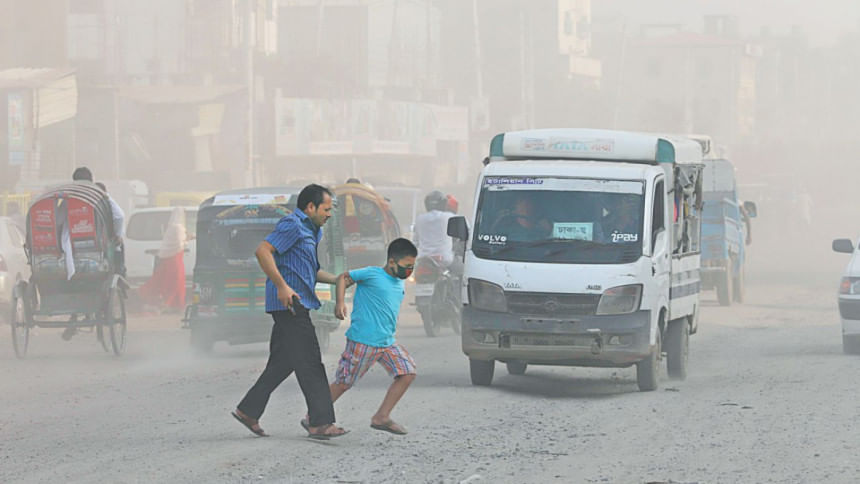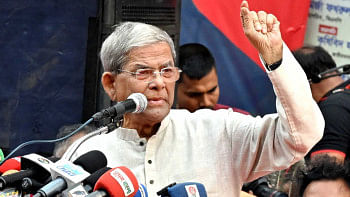It's time to seriously consider a carbon tax in Bangladesh

The recently released special report of the Inter-governmental Panel on Climate Change (IPCC) paints a dire picture -- the global temperature has increased by over 1 degree centigrade over pre-industrial levels (mid-1800s).
It calls for a global commitment to action towards capping the temperature increase at 1.5 degrees, which it says has to be achieved by 2030.
The environmental impacts of human-induced climate change are already being felt, most acutely at the moment by fragile ecosystems such as coral reefs and mangrove forests.
In the same week, the Nobel Prize for Economics was awarded to William Nordhaus (along with Paul Romer), for his work on economic models that consider the impacts of climate change on growth.
In the decades after Nordhaus talked about the negative externalities of growth driven by fossil fuels, most countries these days acknowledge environment protection and climate change as an urgent priority.
Several countries have taken concrete action. One of the most common instruments adopted is a carbon tax. Simply defined, a carbon tax is levied on the carbon content of fuels.
An alternative instrument to carbon tax is the use of emission trading systems (ETS) whereby the government fixes the total volume of emission for each type of polluting industry and allocates these pollution rights to industries through an auction system.
The World Bank reports that till date, 45 national and 25 sub-national governments have adopted one or more forms of carbon pricing in their respective jurisdictions. This has helped raise about $33 billion in 2017, an increase of 50 percent over the receipts in 2016.
Bangladesh is just breaking out of the 'less-developed' category, attempting to secure and enhance the welfare of its population that is approaching 170 million.
The government's Perspective Plan 2041 seeks to achieve upper middle-income status in fiscal year 2031 and higher income status by fiscal year 2041.
Indicative projections show that to achieve these targets GDP will need to grow at around 8-9 percent from fiscal year 2020 to fiscal year 2041.
In light of this, it is inevitable that the demand for energy is poised to increase rapidly, and given the overwhelming dependence on fossil fuels, carbon emissions are bound to increase in tandem.
There is very little use of incentive policies especially taxes and pricing policies.
Indeed, by providing heavy subsidy on natural gas and fuel oil, Bangladesh provides an incentive for excessive consumption of fossil fuel. Therefore, fossil fuel pricing policies are inconsistent with carbon reduction objective.
This is a fundamental contradiction in environmental management in Bangladesh that must be addressed soon. Indeed, it's time for Bangladesh to seriously consider a 'carbon tax' proposal.
APPROACH TO CARBON TAX IN BANGLADESH
The pricing reform for natural gas is off the table and the government will not accept taxation of fuel oil or coal for electricity generation to avoid electricity cost escalation.
Similarly, the government will oppose the taxation of kerosene to avoid pass through effects on the poor. Therefore, a pragmatic approach to a carbon tax would be to start with a tax on gasoline.
This is in line with the experience in our neighbourhood: in India carbon tax emerged first in 2010 as a tax on domestic coal, and was later broadened to include petrol and then diesel.
The tax rates have also been adjusted gradually, and in recent years, the government has used the tax component to mop up revenues at times when global crude oil prices have been low.
This pragmatic approach appears best suited to the current political economy environment of Bangladesh. The reduction (and gradually, elimination) of fuel oil subsidy at the pump gate through proper pricing policy is a first step in a sequential programme to reducing carbon emission from the use of fuel oil.
This reform can be combined with the imposition of an excise duty on petrol and diesel that is in addition to the normal applicable VAT.
The tax rate can also be varied in relation to international prices. Thus, the tax rate can be increased when oil prices are low and reduced when international oil prices go up.
WILL A CARBON TAX WORK?
To answer this question and to illustrate the importance of a carbon tax as an instrument for carbon dioxide reduction, simulations were carried out using two models: a model that estimates the revenue and carbon dioxide reduction effects of a carbon tax on gasoline and a second model that incorporates the general equilibrium effects of this carbon tax for output and prices.
The combination of the reduction in carbon dioxide emission and proper use of carbon revenues will not hurt long-term GDP growth or adversely affect the income of the poor. This should allay the concerns of those who claim that carbon taxes will negatively affect the growth prospects of Bangladesh.
The modelling shows that in the short term, defined as 2-3 years, there will be a small decrease in GDP with the initial reduction in transport services, which in turn will affect industry and agriculture. It is assumed that efficiency improvements and substitution of clean energy/technology takes effect from fiscal year 2022 onwards, which will offset the output loses.
The longer-term impacts of cleaner air and more productive stock of natural resources on health and productivity should also be measured to bolster the case for a carbon tax.
It is equally noteworthy that the carbon tax can yield additional revenue. These revenues can be used to invest in clean fuel, clean technology and infrastructure projects that will help offset the loss of output from carbon taxes.
Importantly, simulations show that a carbon tax incidence would be progressive in the sense that the cost of living increase is highest for the top fifth of the population and lowest for the bottom fifth.
This is an important estimate that should be used to win over those who argue that there are negative effects of carbon taxes from an 'equity' perspective. In fact, evidence shows that the benefits of oil subsidy mostly accrue to the non-poor.
In order to implement a carbon tax, the government will have to launch a major advocacy campaign to explain the benefits of such fiscal action.
There are poignant stories and examples of how environmental damage hurts the poor in Bangladesh and adversely affects growth in the long-term – these need to be brought out front and centre when championing a carbon tax proposal.
The massive health costs of air pollution in Dhaka should be a wake-up call for all to fight for cleaner air and reduction of carbon emission.
Bangladesh is currently way behind the rest of the world in clean energy and clean technology. Proper pricing of fossil fuel along with the carbon tax will provide the incentives to reduce the consumption of these fuels and also motivate private investment in clean energy and clean technology.
The increase in cost of living for the poor can be offset through income transfers from additional social protection spending based on carbon tax revenues. Thus, a proper combination of fossil fuel pricing, carbon tax and investments can make carbon tax a win-win policy package.
Sadiq Ahmed is vice chairman of the Policy Research Institute of Bangladesh.
Suvojit Chattopadhyay is Bangladesh country manager of Adam Smith International.

 For all latest news, follow The Daily Star's Google News channel.
For all latest news, follow The Daily Star's Google News channel. 



Comments